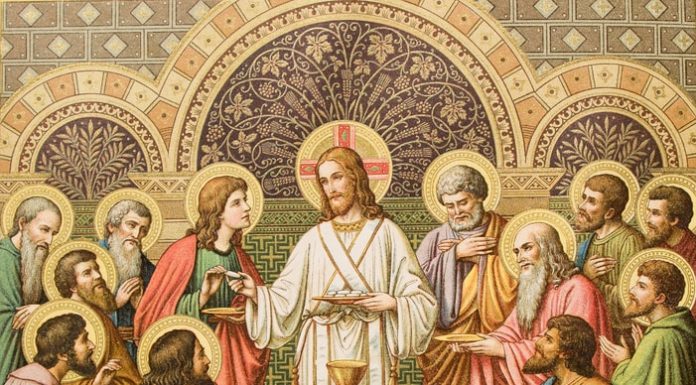Column by Jonathan Nagy
In 1978, the Italian-born German adventurist, Reinhold Messner, along with his climbing partner, Peter Habeler, became the first people to successfully climb Mount Everest without the use of oxygen tanks. After descending from the 29,000-foot-tall apex, they arrived back at base camp barely alive. When asked why he went up there to die, Messner exclaimed, “I didn’t go up there to die. I went up there to live.”
This has been a favorite story of mine, and I recently remembered it when reflecting about Jesus’ passion and death. Jesus willingly accepted his death on a cross, a death no one wanted for himself. If the mass media existed in 30 AD, I’m sure they would have been in His face asking the same question the media asked of Messner. However, Jesus’ answer would have been slightly different. He would have said, “I didn’t go up there to die. I went up there so that YOU may live.”
It is one thing in life to make a sacrifice for oneself, but an entirely higher level exists for those who are self-sacrificial for others, mimicking the love and care of Jesus Christ. In his Palm Sunday homily in 2009, Pope Benedict XVI said, “Self-sacrifice in imitation of Christ is the key to the Christian life.” That is a powerful and difficult ask. However, we are not being asked to be physically nailed to the cross, although sometimes sacrifice can emotionally feel that painful. Pope Benedict went on to explain what we are supposed to learn about sacrifice from the crucifixion, adding, “The principle of love, which is at the heart of the Christian faith and is exemplified in Christ’s crucifixion, demands a more universal vision that looks outward and not just inward. This orientation toward others involves not only a ‘single great decision’ in a person’s life, which is relatively easy, but must be a continuing attitude implemented daily in everyday situations. No successful life exists without sacrifice. When I look back on my personal life, I have to say that precisely the times when I said ‘Yes’ to a sacrifice were the greatest and most important moments of my life.”
No successful life exists without sacrifice. What a powerful, powerful statement. So many of our great saints and holy people sacrificed in many ways. Saints Francis of Assisi, Elizabeth of Hungary, Katherine Drexel, and Servant of God Demetrius Gallitzin all renounced and sacrificed their wealth to minister to God’s people. Saints Padre Pio, Terese of Lisieux, Bernadette, and soon-to-be Saint Carlo Acutis all died of terrible diseases, but offered up their sufferings as a sacrifice to God for us. Saints Stephen, Cecilia, Maria Goretti, and so many other martyrs sacrificed their lives for the love of Jesus Christ. All of these saintly people understood sacrifice, and in their own way, offered their suffering for others and their beliefs.
Jesus told us all how to sacrifice. In Matthew 16:24, He said to the disciples, “If anyone wants to come after Me, he must deny himself, take up his cross, and follow Me.” Three tasks are given in that sentence. First, we must deny ourselves. In other words, we are to turn away from ourselves for the sake of turning to God. We can have desires in our hearts, but we are to deny our own way of achieving them and trust the Lord to do it His way. As much as I love Frank Sinatra’s “My Way,” Frank got it all wrong. A righteous life is one given to God.
Secondly, we must take up our cross. Everyone has at least one cross to bear – an addiction, troubled family, health issues – just to name a few. We have to acknowledge and accept this cross daily. We have to let go of anger, hurt, and pain, and replace them with forgiveness, acceptance, and rejoicing. Father Mike Schmitz once added, “We have to mortify ourselves. To mortify means to die a little death, a death so that we can life for Jesus. We must work to look like Jesus while on this earth. Stuff we hold on to doesn’t help us to look like Jesus. We have to die to ourselves with those things.” Anytime I or a family member would complain about some form of suffering, my grandma Dorothy would say, “Offer it up to Jesus.” Turn our sufferings and sacrifices into a positive by giving them over to God. Our Lady of Fatima asked Lucia, “Do you wish to offer yourselves to God to endure all the sufferings that He may be pleased to send you, as both an act of reparation for the sins with which He is offended and an act of supplication for the conversion of sinners?” When Lucia responded ‘Yes’, Our Lady said, “Well then, you will have much to suffer. But the grace of God will be your comfort.” Sacrifices for God and others pleases God. Our Lady of Fatima encourages everyone to do at least one small act of penance each day.
The third directive in Matthew 16:24 is to follow Jesus. What on the surface may seem like the simplest of the three tasks, it is by far the most difficult. The New Testament is full of encounters of Jesus asking people to follow Him and their subsequent denials of the requests. Pope Benedict’s words, “No successful life exists without sacrifice,” is reflected in those Bible stories. We remember the names of those who did deny themselves, pick up their crosses, and follow Jesus. We don’t know or remember the names of those who chose to cling to the things of earth. On that note, I have the utmost respect for every priest and nun, for they all have completely given up their desires and wants in life to do the will of God. We all owe them a deep sense of gratitude, and we must pray daily that other young men and women answer that call and follow Jesus!
For us, to make small sacrifices and penances in our daily lives may seem challenging. Many Catholics attempt this during Lent, and once Lent is over (and often before it is over), abandon the sacrifices that were made. Giving up favorite foods, television shows, and activities is just a small level of sacrifice and penance. Those are all accomplished with ourselves in mind. To self-sacrifice for others holds even more water. Maybe we need to take time to listen to someone talk who we normally do not give the time of day. Maybe we skip a meal as a sign of solidarity with those who hunger daily. Perhaps we can give a little more financially to help organizations and individuals in need. As Father Arnone said in his February 17th Life-Changing Lent reflection, “I do not promote the notion of ‘give until it hurts.’ That would mean our charity has a painful limit. Rather, I promote the notion of ‘give until it makes a difference.’ It should make a real difference for the recipient of our almsgiving. It should also make a different in you the giver, that because you shared your blessings, they are also blessed thanks to your almsgiving.” The giving does not need to be limited to just our treasures but should be extended to our time and talents as well. Giving of ourselves is one way we can look like Jesus.
Jesus willingly allowed himself to be sacrificed so that we might live. We must show Him that we are grateful for the life worth living. We cannot let His sacrifice be in vain, and the best way we can exhibit this is by being sacrificial to others. There is an old phrase stating that when you die, you can’t take it with you. You can’t take anything with you beyond your earthly life except for your soul. When we die, we are out of chances. God will show us our entire lives, for He has known us since before we were born. He will show us the times we could and should have given more of ourselves in so many ways. The less we leave on the table, the better our odds of joining Him in Paradise.
As Our Lady of Fatima asked, offer small penances for the world. Eventually, we will become so accustomed to the small penances that we will seek to tackle the large ones, and then we can truly deny ourselves, take up our crosses, and follow Jesus Christ. Climb the difficult mountains of life and offer up the sacrifices to God, becoming Him to others. Only through this will people truly see Jesus in us!
Jonathan Nagy, M.Ed., is the Dean of Students and Social Studies teacher at Bishop Carroll Catholic High School in Ebensburg. He is also the Music Director at the Basilica of Saint Michael the Archangel in Loretto.






























